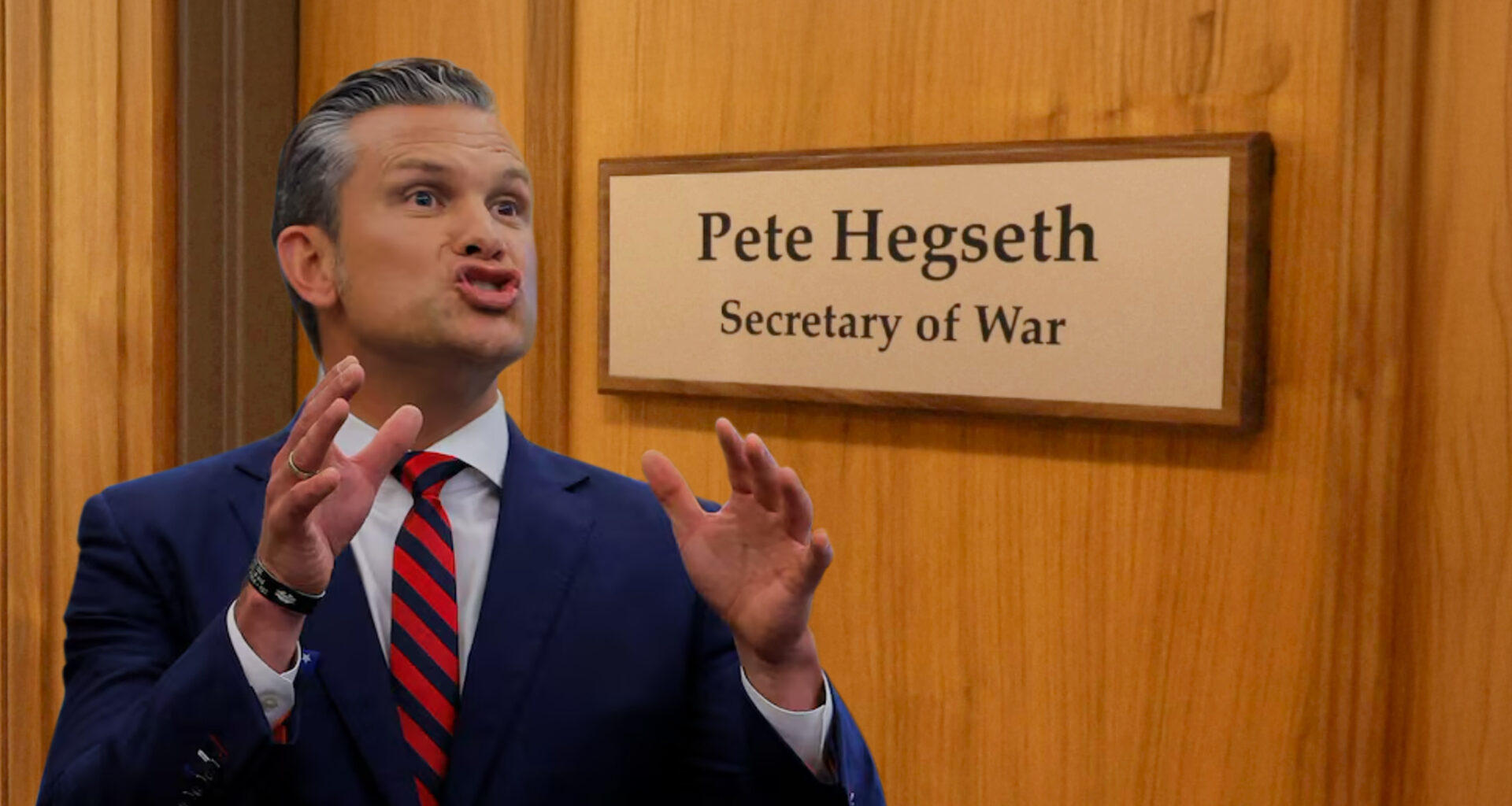Donald Trump has made one of the most remarkable blunders of his political career, beginning the process of changing the name of the “Department of Defense” to the “Department of War.” In doing so, Trump is eliminating an Orwellian propaganda term that was meant to disguise aggression as defense. Trump and “Secretary of War” Pete Hegseth believe that this new name will emphasize the “lethality” of the department. But what it will actually do—assuming it is followed through on, which is doubtful—is make it more obvious that the U.S. state is a warmongering aggressor, and galvanize opposition to U.S. military spending. It was difficult to convince Congress to cut “defense spending,” since, after all, who can oppose defense? On the other hand, “war spending” is easy to make a case against. The American people support defense, but they are sick of war.
Those on the left have long treated the name “Defense Department” as a misleading euphemism, one that serves to perpetuate the false idea that America’s bloated military is in fact necessary to keep the country safe. Senator George McGovern wrote in 2011 that:
ith the renaming of the War Department as the Defense Department in 1947, the military part of the government became sacred, virtually untouchable. How could anyone vote to cut defense unless he or she is willing to face political defeat?
The daughter of legendary peace activists Philip Berrigan and Elizabeth McAlister recalls that her parents outright refused to call it the Defense Department, always using the term “War Department,” and Noam Chomsky and Edward S. Herman wrote that “any good student of Orwell should have realized that a change in the name of the U.S. War Department to ‘Defense Department’ in 1947 signalled that henceforth the state would be shifting from defense to aggressive war.” Media critic Norman Solomon lamented in 2021 that the term “Department of Defense” made it more difficult to think clearly about the nature and function of the agency:
In the real world, the United States spends more money on its military than the next 10 countries all together. And most of those countries are military allies. What about military bases in foreign countries? The U.S. currently has 750, while Russia has about two dozen and China has one. … U.S. bases abroad “cost taxpayers an estimated $55 billion annually.” […] President Biden is “perpetuating the United States’ endless wars” in nations including “Iraq, Syria, Somalia and Yemen” while escalating “war-like tensions with China with a military buildup with Australia and the UK.” All this is being funded via a “defense” budget?. … Today, the Department of Defense remains an appropriately capitalized proper noun. But the department’s official name doesn’t make it true. To call its massive and escalating budget a “defense” budget is nothing less than internalized corruption of language that undermines our capacities to think clearly and talk straight. While such corroded language can’t be blamed for the existence of sloppy thinking and degraded discourse, it regularly facilitates sloppy thinking and degraded discourse. Let’s blow away the linguistic fog. The Pentagon budget is not a “defense” budget.
Trump has granted the leftists our wish: He has admitted that “defense” is an inaccurate descriptor of what the “Department of Defense” actually does. He has allowed us to talk honestly for once about the fact that the military wages war, not some vague thing called Defense, and these operations are frequently aggressive in nature. In doing so, he has annoyed members of the Pentagon brass—mostly because the rebrand is a logistical nightmare. Officials are horrified that they may need to “change Defense Department seals on more than 700,000 facilities in 40 countries and all 50 states,” including “everything from letterhead for six military branches and dozens more agencies down to embossed napkins in chow halls, embroidered jackets for Senate-confirmed officials and the keychains and tchotchkes in the Pentagon store.” But in addition, according to one former defense official quoted, the name change “will be used by our enemies to portray the United States as warmongering and a threat to international stability.” Well, yeah. And not just by “our enemies,” but by those sensible persons who have long pointed out that the U.S. is warmongering and a threat to international stability.
Not that Trump was trying to appease Chomsky and Solomon with this move. His theory, as he explained in the Oval Office, was that “we won World War I, we won World War II, we won everything before that and in between, and then we decided to go woke, and we changed the name to DOD. So, we’re going Department of War.” Well, that’s certainly an interesting historical narrative. Maybe we wouldn’t have lost in Vietnam and Iraq if we’d changed the name of the Defense Department!
It’s fascinating to hear Trump describe “defense” as a “woke” term. Among presidents, Trump has an uncommon contempt for the myth of American idealism. He is less inclined to pretend that the U.S. is anything other than an imperial aggressor that takes whatever it can get its hands on. Other presidents have felt the need to engage in elaborate pretenses that U.S. actions are noble and virtuous, that they serve the interests of humanity and not just the narrow self-interest of American elites. Not so with Trump. He proudly espouses the idea that the U.S. does not need to care about the rest of the world, or about international law, or about morality. He doesn’t feel the need to engage in cant about the Rules-Based Order. He is open about being a gangster and thug in the Putin mold. His White House, explaining the DoD name change, was frank: it “sharpens the Department’s focus on our own national interest and our adversaries’ focus on our willingness and availability to wage war to secure what is ours.” According to the Executive Order, the rebrand “demonstrates our ability and willingness to fight and win wars on behalf of our Nation at a moment’s notice, not just to defend.” We don’t just wage defensive wars against outside threats, then. We also wage aggressive ones to advance our “national interest.”
Of course, this is true and honest. The Iraq War and the Vietnam War were in no way “defensive.” These egregious slaughter campaigns were fought to advance the perceived “national interest” (in reality, the interest of the country’s owning class). There is a danger in abandoning the dishonesty, though, which is that it legitimizes the pursuit of predatory self-interest. “Hypocrisy is the tribute that vice pays to virtue,” as the saying goes. Trump doesn’t even pretend to want to live in a world governed by international law or a moral code other than the “law of the jungle.” The danger is that he will convince Americans that it’s perfectly legitimate to wage aggressive wars in order to enrich ourselves, because we live in a world of enemies who would do the same to us if they got a chance. In the age of nuclear weapons, this is a recipe for civilizational suicide.
The good news, however, is that Trump has made the task of reining in our bloated military that much easier. Trump, being stupid, often misunderstands the purposes of U.S. propaganda efforts—which is blatantly obvious when you look at his slashing and burning of federal programs. So, for example, he seemed to think USAID was a genuinely benevolent effort to aid the rest of the world. Of course, that meant it had to go. He evidently took the federally-funded radio network Voice of America at its word that it was simply trying to spread useful information around the globe, and he thought “Why the hell are we doing that?” Trump did not realize that VoA is a propaganda network waging an information war against the country’s adversaries. Similarly, he did not grasp Sen. McGovern’s point that calling the military a “defense” agency insulates it from budget cuts, whereas calling it a “war department” means that members of Congress will have to justify funding war rather than funding defense—a much more difficult task, given that Americans are so weary of war that Trump himself had to pretend to be pro-peace in order to get elected.
Of course, as with much that Trump does, the name change might be bullshit. He’s set defense.gov to redirect to war.gov, but Congress needs to approve the name change for it to be official, and who knows if this will be abandoned once the cost of changing millions of pieces of stationery, lanyards, and signs becomes clear? But those of us who hate war should welcome this new honesty about the “defense” department’s function.



